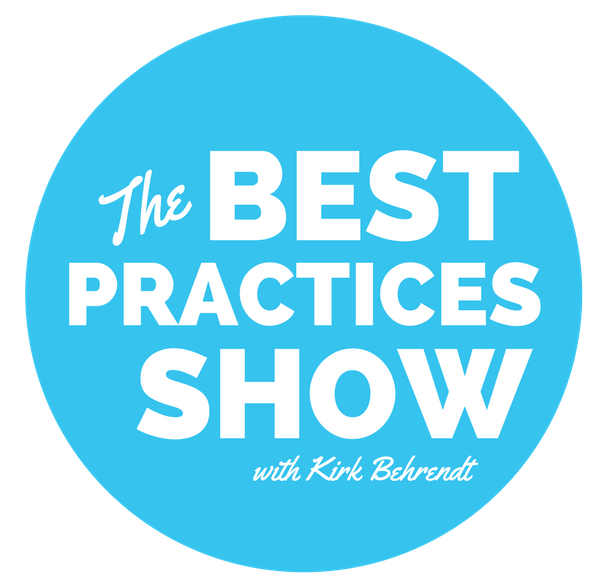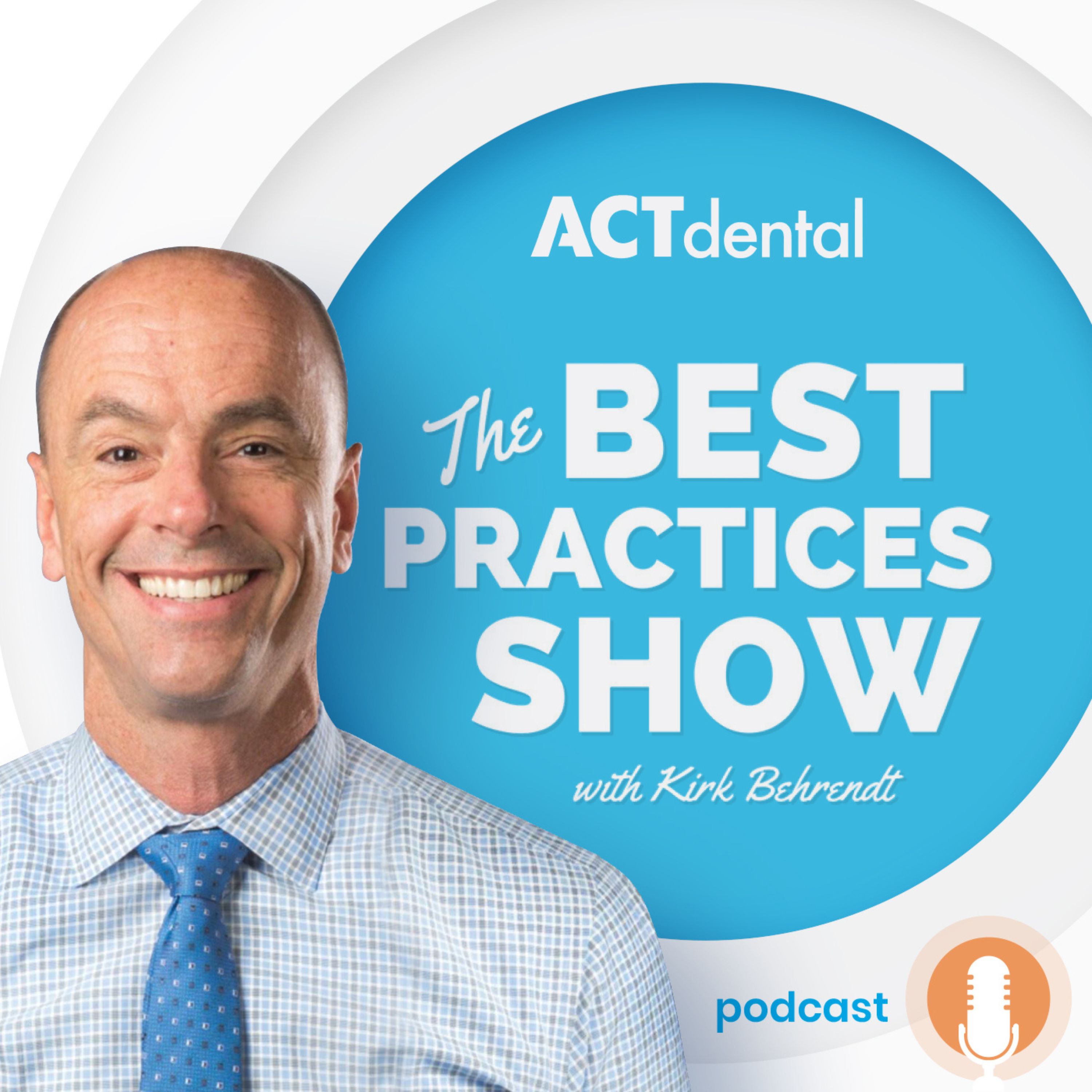Episode 623
623: See Inside the Mind of One of the Most Brilliant Teachers in Dentistry - Dr. Christian Coachman & Dr. Bill Robbins
See Inside the Mind of One of the Most Brilliant Teachers in Dentistry
Episode #623 with Dr. Christian Coachman & Dr. Bill Robbins
Every great mind is taught by brilliant teachers. In this two-part episode, Kirk Behrendt and Dr. Christian Coachman brings back one of those brilliant teachers, Dr. Bill Robbins, to share his thoughts on building a successful and happy career in dentistry. To hear about what brought him in and keeps him in this amazing profession, listen to Episode 623 of The Best Practices Show!
Episode Resources:
- Join Dr. Coachman on Facebook
- Follow Dr. Coachman on Instagram
- Learn more about Digital Smile Design
- Register for DSD Residency 1
- Send Dr. Robbins an email
- Join Dr. Robbins on Facebook
- Learn more on Dr. Robbins’s website
- Subscribe to the Best Practices Show Podcast
- Join ACT’s To The Top Study Club
- See ACT’s Live Events Schedule
- Get the Best Practices Magazine for free!
- Write a review on iTunes
Links Mentioned in This Episode:
Register for the Global Diagnosis Education Symposium (September 7-9, 2023)
Read Global Diagnosis by Dr. J. William Robbins and Dr. Jeffrey S. Rouse
Main Takeaways:
Success will take a lot of hard work.
You can't become successful by yourself.
Cultivating relationships is critical in dentistry.
Discover ways to maintain the “beginner’s mind”.
Find people who will support you in your journey.
Quotes:
“That which makes dentistry so fun, so enjoyable, is the relationship part of it. My father was not a great clinician. He was actually a farmer who loved to farm, and dentistry just supported his bad habit of farming. He didn't have the passion for dentistry that I have. So, it was the relationship part that I first learned about when I hung out with him, and how he related to his patients, and how much they loved it. So, what drew me into dentistry, I think, was the relationship, not the technical part. I mean, from the clinical part, obviously, dentistry is so much better [today] in so many ways. Back in his day, what he would do — I would stand there and watch him — he would extract 28 teeth on a patient and put in an immediate denture. That was a normal day for him. Well, that's not a normal day anymore. We don't do that anymore. But the relationship part of it, I think, is what drew me into it. And I would say, at this stage, it's what still is the most rewarding for me because I'm still practicing.” (9:03—10:15)
“I [sold my] practice to a young prosthodontist three years ago, and she's been a wonderful friend and boss. What brings me to the office these days — what I continue to enjoy doing here — is primarily seeing my old patients. So, I'm still doing dentistry, and I do some sophisticated dentistry. I don't work nearly as hard as I used to, but I see my old patients that are really her patients now, and I have time. I'm not rushed anymore, so I have time to sit and talk with them. And so, it's interesting. What brought me to dentistry was the relationship part of it, and what's going to usher me out at the end is the same. And then, there was a lot of technical dentistry in between.” (10:16—10:59)
“We all go through many different passages in our lives. I went to the Pankey Institute many years ago, and I learned about the Cross of Life and the four arms of the cross and happiness in the center. I've come to believe that it's a very difficult and perhaps even a false thing that we're trying to attain with this goal of living our life in balance.” (11:13—11:41)
“The idea of living your life in balance is impossible. If you're building a practice, it's going to take more of your effort than the play side of your life. So, I'm not demeaning play and family and work. I think those things are incredibly important. But certainly, there are times in your life passages when you're going to have to commit more to one of those four arms than the other. So, I think that the success of a young dentist is going to take a lot of work, and there's no way around it. And I think the next part of it is, you can't do it by yourself. Clearly, you have to have people taking this walk with you. I've had so many people along the way that have helped me from the business side, the professional side, the emotional side, the behavioral side. Dental school is literally just dipping your toe into the pool.” (12:03—13:01)
“What I've loved in my career is watching the light bulb go on. I know that Christian and [Kirk] also have experienced that a lot. That's when you're working with a younger dentist, student, or resident and, all of a sudden, they get it. There's some concept that they get. That feeling, I think, transcends almost any for me as a teacher, when I see a light bulb go on in the mind of a young dentist, and they get either a vision, or at least they get an idea of what we were talking about, what the goal was for the discussion we were having. And so, the thing I love is being around young dentists. I love dental students and young dentists and residents because they make me feel young. They energize me. When the light bulb goes on in one of their heads — and less now, in all honesty, but occasionally the light bulb goes on in my head also. So, there's still clearly a give and take.” (13:21—14:29)
“I've always been so grateful to my father for many, many reasons. But one of the reasons is that he had a vision for me that I didn't have for myself. He essentially gave me the freedom to go off and pursue this other career — and he would’ve loved to have practiced with me. We would’ve had fun together. It would’ve been a successful practice. But he knew the type of dentistry he was practicing wasn't going to be rewarding to me, and I think he knew that there was more there for me than a career pulling teeth in Little Rock. And so, he gave me the freedom and pushed me out of the nest to do the academic thing first. And I never returned. I never went back into practice with my father. But I think he was very proud of the academic career that I had. He never saw me in private practice because he died. I was in academics for 25 years, and he died before I went into private practice. So, that was the front end, the freedom that my father gave me to spread my wings.” (19:25—20:36)
“[Digital Smile Design] has been one of the most important and relevant things to have happened to me in the last decade for a couple of reasons. First of all, it's really fun. It really helps with this whole issue of patient communication. That is, for me, the crux of DSD, and that is the patient communication part. But it's also, I think, helped me to remain relevant because as I age and stand in front of groups, people know I'm getting older. And in order to be relevant to a younger group of dentists, you can't be talking about gold restorations. I mean, I still do gold in my practice. But you can't lecture about that because it's not relevant anymore to them. And so, DSD has brought a lot of pleasure to me in my clinical practice, but it's also helped me to remain relevant, I think, in the eyes of younger dentists.” (23:17—24:13)
Snippets:
0:00 Introduction.
5:44 Why Dr. Robbins chose dentistry.
7:54 The importance of relationships in dentistry.
11:01 Keys to a successful and happy career.
14:40 The pillars for success.
15:26 Light-bulb moments in Dr. Robbins’s career.
20:36 How DSD keeps Dr. Robbins relevant.
Dr. Christian Coachman Bio:
Combining his advanced skills, experience, and technology solutions, Dr. Christian Coachman pioneered the Digital Smile Design methodology and founded Digital Smile Design company (DSD). Since its inception, thousands of dentists worldwide have attended DSD courses and workshops, such as the renowned DSD Residency program.
Dr. Coachman is the developer of worldwide, well-known concepts such as the Digital Smile Design, the Pink Hybrid Implant Restoration, the Digital Planning Center, Emotional Dentistry, Interdisciplinary Treatment Simulation, and Digital Smile Donator.
He regularly consults for dental industry companies, developing products, implementing concepts, and marketing strategies, such as the Facially Driven Digital Orthodontic Workflow developed in collaboration with Invisalign, Align Technology.
He has lectured and published internationally in the fields of esthetic and digital dentistry, dental photography, oral rehabilitation, dental ceramics, implants, and communication strategies and marketing in dentistry.
Dr. Bill Robbins Bio:
Dr. J. William Robbins, D.D.S., M.A., practices part-time and is an Adjunct Clinical Professor in the Department of Comprehensive Dentistry at the University of Texas Health Science Center at San Antonio Dental School. He graduated from the University of Tennessee Dental School in 1973. He completed a rotating internship at the Veterans Administration Hospital in Leavenworth, Kansas, and a two-year General Practice Residency at the V.A. Hospital in San Diego, California.
Dr. Robbins has published over 80 articles, abstracts, and chapters on a wide range of dental subjects and has lectured in the United States, Canada, Mexico, South America, Europe, the Middle East, and Africa. He co-authored a textbook, Fundamentals of Operative Dentistry – A Contemporary Approach, which is published by Quintessence, and is in its 4th edition. He recently co-authored a new textbook, Global Diagnosis – A New Vision of Dental Diagnosis and Treatment Planning, which is also published by Quintessence.
Dr. Robbins has won several awards, including the Presidential Teaching Award at the University of Texas Health Science Center, the 2002 Texas Dentist of the Year Award, the 2003 Honorary Thaddeus V. Weclew Fellowship Award from the Academy of General Dentistry, the 2010 Saul Schluger Award given by the Seattle Study Club, the Southwest Academy of Restorative Dentistry 2015 President’s Award, and the 2016 Academy of Operative Dentistry Award of Excellence. He is a diplomate of the American Board of General Dentistry. He is past president of the American Board of General Dentistry, the Academy of Operative Dentistry, the Southwest Academy of Restorative Dentistry, and the American Academy of Restorative Dentistry.


